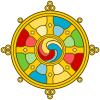


| Part of a serieson |
| Tibetan Buddhism |
|---|
 |
|
|
|
|
|
Practices and attainment |
|
|
|
Institutional roles |
|
|
|
|
|
|
|
History and overview |
|
|
Shabkar Tsokdruk Rangdrol (Tib. ཞབས་དཀར་ཚོགས་དྲུག་རང་གྲོལ་, Wylie. zhabs dkar tshogs drug rang grol) (1781–1851) was a Tibetan Buddhist yogi and poet from Amdo.[1] Shabkar's yogic and poetic skill is considered second only to Milarepa.[2][3]
Shabkar began his spiritual practice early, completing a one-year retreat at the age of 16, later becoming a Gelug monk at 20.[4] Shabkar studied with masters of all major Tibetan Buddhist schools including Gelug and Nyingma, and received Dzogchen teachings from his main root guru Chögyal Ngakgi Wangpo.[5] He spent years in solitary retreats in various caves, woods and mountains of Tibet.[6]
Shabkar's works express non-sectarian ideals similar to those of the 19th century Rimé movement, even though he predates the movement by about three decades and never met with any of the Rime masters from Kham.[7] Shabkar also held that even non-Buddhist religions are manifestations of the Buddhas:
Thus, one should know all the tenets of the religions of Buddhism and non-Buddhism—for example, other religions, Bönpos, the Chan Buddhists, the Nyingma, the Kagyus, the Sakya, the Geluks, and so forth—to be the emanations of the buddhas and bodhisattvas.[8]
Shabkar was a prolific writer with his collected works running into several volumes. One of his key works is a series of poems on trekchö and tögal, Khading Shoklap—Flight of the Garuda which has become an important text in the Nyingma Nyingthig tradition.[9]
He also wrote a spiritual autobiography in mixed prose and verse, which is considered one of the lengthiest and most masterful of the Tibetan namtar literature.[10]
Shabkar also wrote works promoting vegetarianism and compassion for animals.[11]
| International |
|
|---|---|
| National |
|
| Other |
|